Stately Elegance: 1939 Packard Model 1708 Limousine
At the searing height of the Great Depression, America’s wealthy class and its statesmen were driven in some very stately cars, particularly cars like this 1939 Packard Twelve, Seventeenth Series. Governor and President Roosevelt were often found in the back seat of a smooth-running Packard–these cars positively exude a quiet seriousness bordering on regal. A total of 16 different Packards were the chosen cars of Presidents Hoover, Roosevelt, and Truman; a Packard was in use from 1928 through at least 1951. FDR loved the Packard Twelve automobile so much that he sent a 1935 armored Packard limousine as a gift to none other than Joseph Stalin who became quite enamored with it as his official car. This beautiful Packard Twelve Model 1708 is located in Quincy, IL, and is currently for sale here on BarnFinds Classifieds with an asking price of $125,000. The posting says this car is in original condition.
Look at the wonderful half-acre of the front hood, the full and billowy rounded fenders that perfectly mimic the lines of the 8.25 x 17 wide whitewall tires, the spare tire on each side, the delicate cormorant hood ornament, and the chauffeur’s door dead n the middle of the 230.8″ length with the special person’s head framed by the small window over the rear tire. It’s the true archetypical land yacht that when you see it, something serious is going on and as it effortlessly and smoothly goes by barely making a whisper, it’s not something you soon forget the rest of the day or ever. You will likely dream of being the one in the back who gets the door opened for you.
Even in 1939, there was a lot of wood used in making cars; in the Packard 1708, the chauffer’s seat and side panels were one of the wooden on-board features, here covered with padding and black leather. The space between the driver and the passenger were separated by a window that operated with a crank so that conversation between the front and back parts of the car were kept private, if necessary:
The curved woodwork is as lovely and well-varnished as any mansion trim or that found on a classic yacht. Beneath the crank that raised and lowered the chauffeur’s window there are two “opera seats” or jump seats that fold out for use by the children or the mother-in-law:
My, how dreadfully crowded this arrangement must have been for the back seat occupants. Especially with a lack of air conditioning in 1939. Heavens.
We can’t convey the mileage on Seller’s car, but the engine shows signs that quite possibly this car is in its original undisturbed condition. Interestingly, at a time when soup lines were long and bread hard to find in the 30s, carmakers were embroiled in a product war as to what massive number of cylinders they could cram under their hoods. Not only Packard with its Twin Six and later the Twelve engines, but Lincoln, Auburn, Pierce-Arrow, and Franklin all produced twelve-cylinder cars in their 30s luxury car models. Maybach was cylinder crazy in Europe also joined by Rolls-Royce and Hispano-Suizo in making 12-cylinder offerings. Astonishingly, GM’s Cadillac division and Marmon outdid the lot by introducing V-16 engines. The firing order requires a course in advanced mathematics. The Packard Twelve in our subject car is a 67 degree 7.8L “V” engine configuration that makes 175 horsepower. Only 446 Twelves were made in 1939 and Seller indicates that of that number of chassis and engines produced, only 120 1708 limousines were built that year (cannot confirm this claimed statistic). Our subject limo pushes the horsepower through a three-speed manual transmission. Not only did one need to be adept in the manners necessary to be a chauffeur driving this limo for high society passengers, but it was equally necessary to avoid grinding a few pounds of gears in a day’s worth of shifting the Packard’s transmission. Not a chance this would be a fun job in San Francisco’s hilly city streets.
This is a picture of a just-freshened Packard Twelve on an engine stand but is NOT the engine from the Seller’s car. This picture is interesting because it shows the massiveness of the castings and the sheer number of bolts that hold it all together. At the lower right part of the photo, there is a piece of square greenish steel where the engine is mounted to the test stand. If that steel is less than 5/8″ thick, that would be a shock. For a car that weighs in at one human short of 6,000 pounds, this beast of a powerplant is one giant feat of engineering. It has been rumored (but not verified) that a glass of water sitting on the flat spot between the engine and transmission would barely show signs of vibration or rippling when the Twelve was running at cruise rpm–if true, that is some kind of smooth for the sheer mass of metal in motion. Our subject car appears to be an incredibly preserved survivor as an example of unabashed wealth, superior engineering, and the highest level of automotive craftsmanship. For perspective (and completely tongue-in-cheek), if the Packard sold in 1939 for $5,395 (at a time when a new Ford sold for about $850), today it would cost just a tad shy of $100,000. Giving or taking a few dollars, this beautiful piece of automotive excellence and sophisticated luxury has completely held its value–you just gotta find a really, really long garage to drop anchor at night.
Auctions Ending Soon
 2002 Subaru Impreza WRXBid Now2 days$333
2002 Subaru Impreza WRXBid Now2 days$333
 1975 Chevrolet Corvette ConvertibleBid Now2 days$4,000
1975 Chevrolet Corvette ConvertibleBid Now2 days$4,000
 1964 Ford F-100 Camper CustomBid Now2 days$2,000
1964 Ford F-100 Camper CustomBid Now2 days$2,000
 2006 Jeep Wrangler SportBid Now4 days$10,500
2006 Jeep Wrangler SportBid Now4 days$10,500
 1974 Datsun 260ZBid Now6 days$750
1974 Datsun 260ZBid Now6 days$750

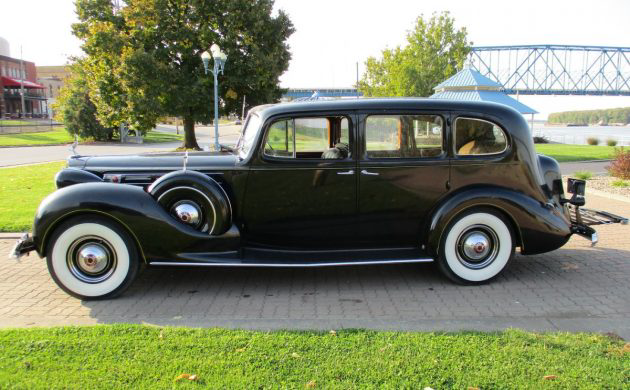
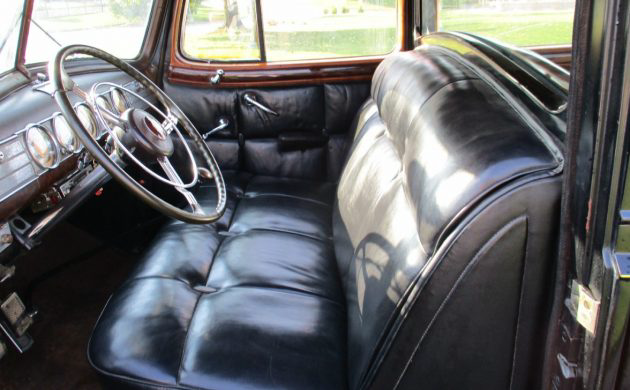
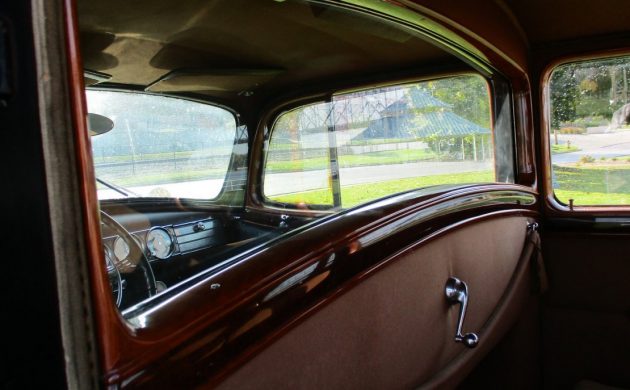
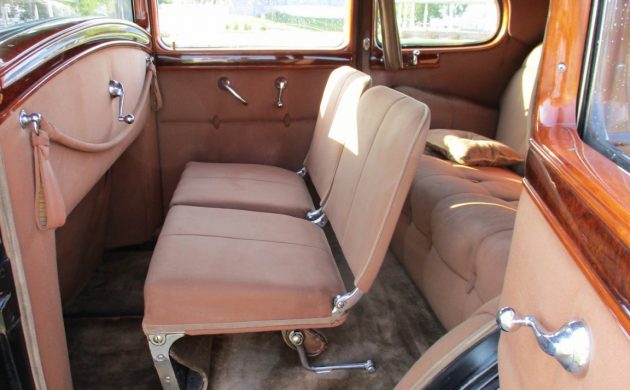
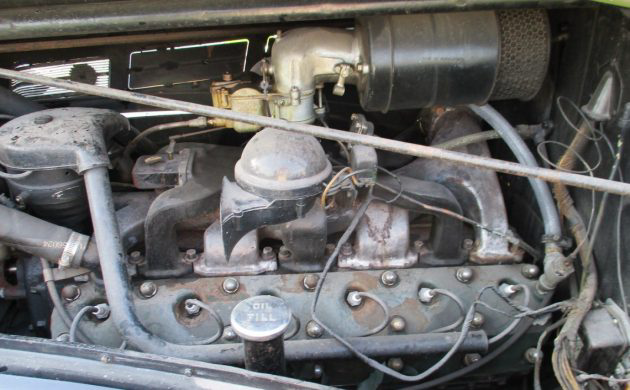
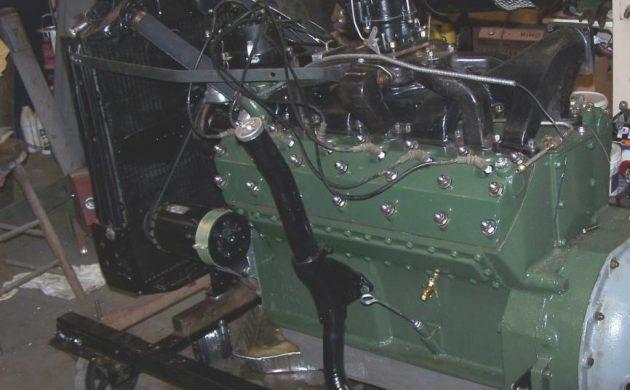

Comments
A very good write up Mike, of an an absolutely stunning automobile. The fact that it is claimed to be original condition is nothing short of amazing. I certainly can’t afford a car like this but I would love to be able to see it to marvel at a car that represents the pinnacle of American automotive design and craftmanship of the 1930s. Definitely a museum piece but what a thrill it would be to be chauffeured around in such luxury.
Thanks, Ford Guy. . .these are the kinds of pieces that are an honor to research and write.
All I could say is. . .”Can you IMAGINE?”
Visit Newport, RI, then realize people had unfathomable amounts of money from their ingenuity. . .and they have driven around in the most precious of cars produced by American engineering and high standards of manufacturing quality controls.
Nuff said.
MJT
Thanks, Ford Guy. . .these are the kinds of pieces that are an honor to research and write.
All I could say is. . .”Can you IMAGINE?”
Visit Newport, RI, then realize people had unfathomable amounts of money from their ingenuity. . .and they have driven around in the most precious of cars produced by American engineering and high standards of manufacturing quality controls.
Nuff said.
MJT
This is a volkswagen based kit car. Somebody should clone it into a GTO
Very nice. That 1935 armored Packard limousine gifted to Joseph Stalin is on display at a museum called Historic Auto Attractions in Roscoe IL. I don’t know how it ended up there.
Been there, very unique museum!
Next time you’re in the area stop at volo auto museum, their Deusenberg collection room is beyond mind bogling (im surprised there wasnt any guards and turrets considering the multi milion dollar value) but they have tonnes of cool colections stuffed in every nook and cranny. I rember enjoying the early snowmobiles, the mitary and train collections were also cool (they have the usual muscle car, movie car, early 20th century stuff as well. Including 110yo electric vehicles)
I live 5 minutes away so hit me up for a brew as well
Packard did offer air conditioning in 1939, but I think it was late in the year for 1940 models.
I think the A/C was created by opening a window. Hmmmm, I think any enclosed vehicle has had that option.
Packard did pioneer A/C in (I think) 1940.
In all fairness, my grand parents purchased a second hand 1936 Packard 12 7 Passenger Sedan from a National Park business. What business, I am not sure nor am I sure of which Nat’l Park.
They purchased it I believe in 1938, maybe it was just too old by then.
It was a beautiful car.
I have always liked a Packard, childhood memories, I guess !!! (as I stated April 2020 in BF.)
My grandmother sold it for $50 when I was 12 and that was unfortunate.
My grandmother invented the automatic transmission, she never used a clutch, ever.
She was a very short lady, and by sitting on cushions and phone-books (what are those?), she could see between the dash and top of the steering wheel to drive.
Either my Dad or my grandfather attached wooden blocks on the brake and gas pedals which allowed her feet to be used.
I never did see a wooden block on the clutch, and thus she never made any attempt to use the clutch.
Memories can be great, if you only remember the good ones.
AI–
Granny’s tranny torture is a testament to Packard engineering!
Don’t happen to have a photo of that Packard? Fifty bucks? [Severe anguish and gnashing of teeth.]
Thanks for all the comments–it is interesting the Joseph Stalin car wound up in IL. Wonder if there is an interesting story there?
If the upholstery in that car could speak!
MJT
is this one armored? if not how much would it cost to do?
All I can say is AMAZING! I hope she finds a good home.
I believe Stalin was a fan of Cadillacs (in the 2006 movie “Death of Stalin” my ’39 V16 was used,along with 3 others).His NKVD Chief Beria used a Packard to abduct women from the streets of Moscow.This a nice car.
The price maybe good I don’t know much on the price of packards. Same looking year Pontiac ( may not have been a limo) sold at Kissimmee mecum, for 12000 looked to me like the deal of the week to me. I know apples to oranges, but if you are not set on a packard, there are others that are comparable, for a whole lot less.
I don’t know a lot about the value of Packards, but the demand for 30’s cars continues to drop as those that relate to them pass. I am 68 and LOVE 37 to 39 cars. But most people I know are only interested in muscle cars.
The demise of Packard (I blame Studebaker for destroying what was left of the company) left a void in the industry that likely will never be experienced again. I think of the way they treated their employees, dealers, and ultimately customers. Their engineering and build quality were always top drawer. Lexus came close in their first fifteen years but have “ventured off” of their initial MO.
I paid $25. for my ’38 Packard Twelve in 1956; continue to drive it regularly. To get a perspective in today’s money, I mowed a lot of lawns to save up to buy it – because if you multiple the $25. I paid by about TWENTY that will give you 1) the approx. purchasing power in today’s money and 2) an idea by how much our currency has been de-valued. I probably paid too much, as it needed a motor overhaul, battery, and tires. Yes, the other posters are correct; as the people who have any connection to the “super-luxury” cars of the pre-war era are dying off, the interest and value of these cars continues each year to drop more and more. But let’s be clear..Packard died because it commited suicide – each year after WW II quality and engineering declined, so that by the early 1950’s the cars were so bad they were an industry joke – last year of production couldn’t be given away – broke my heart to see newsreels of the storage yards full of 1956 production un-sold.
Most of us know the Packard car was degraded by the introduction of the 110 and 120 but they DID save the company and a short time later Packard was making big powerful engines for the war effort.The redesigned 1955 and 56 Packards was an attempt to reenter the luxury car market but their legendary engineering failed them.
Debauched currency is killing all of us.Does anyone remember or know what happened the last time an industrial nation printed pretty paper and called it money?
HITLER happened with all of his criminally insane ideas..
Peter,
I have to disagree as to post-war Packard Quality. I’ve owned over 300 Packards, I bought my first at the age of 14. I drove Packards as my everyday cars thru College. My Packards were more reliable than my family’s modern cars, and sometimes stood in when their cars were in the shop for repair.
For 35+ years I owned & operated a large [8 to 12 people] restoration facility, and I’ve worked on everything from Studebakers to Rolls-Royces, and our shop specialized in cars like the Packard and Rolls-Royce. I’ve owned over 30 Rolls-Royces & Bentleys, but I prefer Packards.
I agree with you that when compared to pre-war Packards, the post-war cars were not as good. But that is true of every USA car company. The competition in the 1947 to 1956 time frame [Cadillac, Buick, Lincoln, Imperial] were also good cars, but none would run as reliably as the Packards.
In the late 1980s I owned, at the same time, a 1955 Packard Patrician, a 1955 Cadillac Fleetwood 60s, and a 1956 Imperial sedan. All were reliable cars, and I enjoyed all 3. The last one I had was the Packard. Sold the Caddy to a good friend who continued to drive it as an everyday car until his death, and my Imperial was destroyed when my storage building burned in 1995. Only sold the Packard because it wasn’t air conditioned.
As to the 1956 Packards sitting unsold, Imagine in 1956 when the company announces the closing of the Detroit plant, as a new luxury car buyer, would you buy a sudden “orphan”, or a car from GM, Ford, or Chrysler? That point made, by 1957, there were actually very few unsold Detroit Packards, as Packards continued to be traded in on new Packards. Loyalty was still very high.
I’ve bought several 1956 Packards from the original owners who said they actually bought their ’56 AFTER the end was announced, because they knew it was their only opportunity to get a new Packard. There was even a new Packard dealer [DuBois Packard, Arlington, VA] that opened in 1956, who still managed to sell all their Packards & Clippers by the end of the model year. Mr. DuBois told me he made a profit on each car sold.
Would I rather have a 1938 Packard 12 over a 1954 Packard Clipper? Of course. But I’ll take that ’54 Clipper over most other 1954 US automobiles. In the late 1970s I had a ’54 Clipper Deluxe that had about 150,000 miles and a rod knock on cold starting. Sold the Clipper to another Packard guy 100,000 miles later, it still had the rod knock, and still drove & ran great!
The Packard 12 like my favorite the Model J Duesenberg showed a gesture of contempt for the bad management of the government of monetary policy.
The Packard was a better idea than the Duesenberg because it had world wide service and dealers even in small towns that were well trained in superb service and courtesy.The Duesenberg could be a real pain in the fanny even with the smallest malfunction on a long trip.Even after Packard stopped making cars in 1956 there were former dealers still open to service them and the hope for a reviving was strong.
If this V12 shown can be bought for $100,000 in printing press money it is a bargain.It represents a time and era we hope will never be repeated known as the Great Depression.
Bob, it was actually 1958 that Packard quit making the cars. I know because I use to have a 1958 Packard Hawk
The 57 & 58 Packards were rebadged Studebakers built at South Bend. 56 was the last year for Packard bodies made in Detroit.
Larry,
I was thinking of East Grand Boulevard Packards and not badge engineered “Steadybreakers”from South Bend.
Pierce was also a victim of the hook up with South Bend and there may be others.In reality the Studebaker President?? was a good looking car with the trim suggesting Packard but if you ever drove a Patrician that had a working transmission you would notice a big difference.
I am a pre-war Packard fanatic. All my adult life I have hunted for the right one, at 70 years of age I have to “get off the dime” and buy one. Meanwhile the emphasis this article places on the quality of their engines. Hardly anybody knows that during WW-2 Packard V-12 engines powered the infamous P.T. Boats. High octane aviation gasoline kept those boats moving faster than anything else on the water. They also powered an entire class of minesweepers, which had to be non magnetic, Packard made those out of aluminum. As a retired U.S. Navy Captain I got to see a fair number of Packard Marine engines head to the scrappers in the early 1970’s. So often history passes through our hands and is lost forever.
Bob, I was just talking to my father the other day about how the US government was basically chopping up brand new aircraft in the desert after WWII… It was, is now, and always has been incredibly wasteful. It makes me sad to see any bit of military history thrown away or scrapped.
Skorzeny, Luckily there are a few museums that are able to preserve such equipment from WW-2. From the U.S. government’s perspective, once obsolescence is staring them in the face it is time to sell, lease, give away of scrap it. They never worry about disposal. Mainly because the equipment was bought with “last year’s money”.
Ed P,
I stand corrected. You are exactly right about the ’57 and ’58 Packards as they were produced by Studebaker. I sure do miss my ’58 Packard Hawk (black with gold trim).
I also have a ’29 Packard 4dr Touring Sedan that needs a total restoration or would be an excellent parts car.
My dad was repair offcer in charge of several P T Boat repair bases in New Guinea in W W ll. He had gone to the Packard Marine Engine school in the States. They would swap the old engines out for new or rebuilt ones. There were three in each boat at approx. 1250 h p each. Top speed at best was 45 knots with full armament . They were 12 cylinder engines and later in the war they were equipped with blowers to vastly increase their h p. Used 100 octane aircraft fuel.
it was mentioned in the story about how cramped the rear seats are and how it must have been uncomfortable with no AC, humans were smaller and thinner back then, I have a 1937 super eight club sedan, it a huge car, the interior is small, these day everyone is supersized thanks to modern chemistry.
That being said, why are the cars getting smaller and smaller.
I’m 6’7″, 39″ inseam and can only get into a Rolls Wraith, Porsche Cayenne and a Porsche Panamera. I can no longer get in a Mercedes or any other European car. Not Ford, GM, MoPar, or Japanese, Korean you name it. Pick-up trucks, nope.
I can not get into either the front seat or the back seat of a Rolls Ghost.
Speaking of people getting taller, I had two Great-Aunts one stood at 6’11”, her sister at 7′.
If I were retired (and had a six figure sum of money laying around doing nothing), I would use this car to start a limousine service for weddings, funerals and other special occasions. I wonder how many I would have to do to recoup my investment??? ;)
Lance,
Take it from an expert in the vintage limo business, The best way to end up with $100,000 in the bank after running a vintage limo business for a couple of years, is to start with $200,000.
And know this: The TYPICAL person who would rent this with a driver, will complain of no A/C, no blazing stereo or TV, and leave footprints all over the upholstery. They don’t care about the car, for most people who rent a vintage limo, it’s all about lookin’ good.
Brides will want to sit on the fender or hood for photos [with their shoes on], prom kids have been known to puke on, or knife the seats [or worse], and beware of the movie studio that wants to rent it, then mounts cameras on it, causing damage. They will tell you the damage was already there, and close the film’s production company before you can sue! Had state inspectors require us to install seat belts in the folding jump seats too! Funeral homes are not interested in your car, when they have limousines to pay for every month!
I owned and operated the largest vintage limo service on the east coast of America [12 vehicles at our biggest], and I’ve dealt with all of the situations I describe. Gave up in 1990 and closed, after my liability insurance doubled again for the 4th year in a row, with never an accident!
And speaking of insurance, if you do anything that involves getting paid, even with cash, all vintage car insurance companies say you won’t be insured if you place a claim.
This is exactly what I believed to be true.
Bill – My comments were made tongue in cheek. Over the course of my working career, I’ve made a conscious effort to avoid working with the public; if I’m retired, I’m still not interested in working with the public (or working for that matter). [There is a reason I tell my wife I like dogs more than most people.] Your comments confirmed what I innately suspected. Many thanks for the vintage limousine business education.
Lance,
I thought that might be the case, but I’ve seen more than a few who were serious about trying to enter the vintage limo service business, so I grabbed the opportunity to make the car collecting public aware of the pitfalls.
Lance, about a hundred would do it, based on what folks are willing to pay for rides in “ride” like this. I would expect this beautiful vehicle to end up in the Hamptons.
Lance, about 100 would do it, based on what folks are willing to pay these days for rides in a “ride” like this. But, the eventual buyer will probably take this home to the Hamptons.
Breathless, stunning, elegant, lavish, describes this car as if it were a woman. And now you know why cars are always referred to as feminine. In my experience its always been more to the negative, like when you turn the key and then ” C’mon you b$tch, sl$t, wh$re ” flies out of your mouth when you realize the battery is dead, and it is either cold as hell or Arizona in August. Words don’t do this car justice, it would be an honor to get a ride in this vehicle. The pinnacle of American automotive production.
Vance if you live close to Quincy, IL I would be happy to give you a ride around town
If you are the owner of this Packard, Larry, this has been a nice set of comments mostly showing the same respect for such a piece of legendary American engineering as I have for it.
Thanks for looking in; here’s hoping your car finds a proper home. Wish I had a 300″ long climate-controlled garage.
MJT
To comment on several of the above comments:
Stalin was enamored with Packards, While the 1936 Packard is now in the USA, Stalin’s 37 Packard Super 8 limo is still in Moscow, on display. In 1942, thru the Lend-Lease program, The Soviet Union bought 2 new 1942 Packard series 2008 Super Eight 180 limousines. After the war, Stalin told the ZIS automobile factory to create a new ZIS limo based mostly on the 1942 Packard limos, with some minor changes like eliminating the running boards and sidemount tires, and the rear area looks more like the Cadillac sedans of the same era.
Here’s a link to see what a ZIS limo looks like: https://1.bp.blogspot.com/-MLeuHJqUzQw/TrY9Ix4sQkI/AAAAAAAAATU/tyjATLSDDes/s1600/ZIS+115.jpg
The photo is from a museum in Russia, and the main car is a ZIS 115, the armored version. To it’s right is a very rare ZIS [I think it’s a 116] four wheel drive. To the rear is a later ZIL 111 that vaguely looks like a 1956 Packard.
Air conditioning was first offered in the 1940 Packard models, not the 1939. I have never seen or heard of a 1939 Packard with original A/C. The units were installed by a Cleveland, OH company called Bishop and Babcock.
The Packard Marine V-12 engines were indeed aluminum blocks & heads, there were 3 per PT [Patrol, Torpedo] boat, 2 active to power the boat, with a 3rd midships as a spare. Somewhere I have a photo of a scrapyard filled with hundreds of Packard Marine V-12 engines being destroyed, and another showing mountains of Packard-built Rolls-Royce Merlin aircraft engines, all being smashed apart for scrap. Today a single and complete Packard Merlin will sell in excess of $1 million.
I’ve worked on a few Packard 12’s. The engines really are so smooth that they can idle so slowly, I’ve been able to count the number of times the fan belt numbers go around while it idles! Like the Packard straight eights, you CAN balance a nickel ON EDGE on the top of the motor, while at idle.
Chances are Granny could leave the transmission in second for running around town, and not shift at all.
In 1954 I had a close friend,Bob Wilson whose father we called “old Bob” was a paint and body repairman at Campbell Packard here in Huntington WV.We were coming home from school and stopped there to wait for “old Bob”to get off from work.While there we saw a magnificent 1934 Packard 12 and two older ladies that were identical twins.The Packard had been in their family since new and the clutch finally went out after years of pulling out in high gear.Tom Barton was an old Packard man since the First World War and was explaining the way the 3 speed transmission worked.What these ladies knew was that
if the lever was forward near the clock it would make the car back up and when they pulled it out of reverse it would go to the right and the car would go forward.I don;t know if Mr.Barton ever got those dear ladies to understand how cars worked and I have often wondered where that car went.I have often thought it might be locked away in one of the hundreds of windowless garages in this city’s South Side.
Oh for a time machine.
This is exactly the reason why I can prove that time travel into the past is not possible, or we’d all be looking for those special cars we love so much!
I know this will be considered as sacrilegious to some ( myself included until recently), but a car like this should be in a museum. There just aren’t many left in the world, and the people who saw them brand new are fading away in increasing numbers. Too many people have never seen anything like it. The idea of an automobile has been replaced with computer cars and all of their gee whiz gizmos. You actually had to drive this beautiful automobile, unlike today’s cars that do alot of the driving for you
Beautiful car and I have owned a number of these. When operating correctly they are a pleasure to drive. Having bought and sold a number of Twelves, and closely watching the current market I can say that the asking price is not close to realistic. A car like this can be had in the $75K range, and that may be dropping.
By the end of the 1955 model year the Packard name was associated with profanity and cars up on jack stands with the transmission up on a bench.
Supposedly the bugs were out of the Ultramatic but the damage was done and once public perception,even if erroneous turns against ANY manufacturer it is doomed.To quote a line from Bob Dylan.”Strike another match and start anew because it’s all over now Baby Blue”.I think the 1956 top of the line Packard was the best looking car of the mid 1950’s.A Packard Executive with a standard shift with overdrive and coventional suspension to me would be the road car to have.A local man who had a good income was told he could NOT get a new Clipper in 1955 with a 3 speed standard shift
here in Huntington so he went to Ashland Kentucky and bought the one setting on the show room floor and drove it for years after Packard’Hes demise.
A local doctor here had a 1955 Patrician that put him off the road for the third time with a transmission failure and a state trooper took him to the next town where he bought a Chevrolet and simply abandoned the Packard to
whatever fate awaited it.Later he gave the Chevy to one of his children and bought an Imperial.He was on a trip to Florida when the Packard failed again.